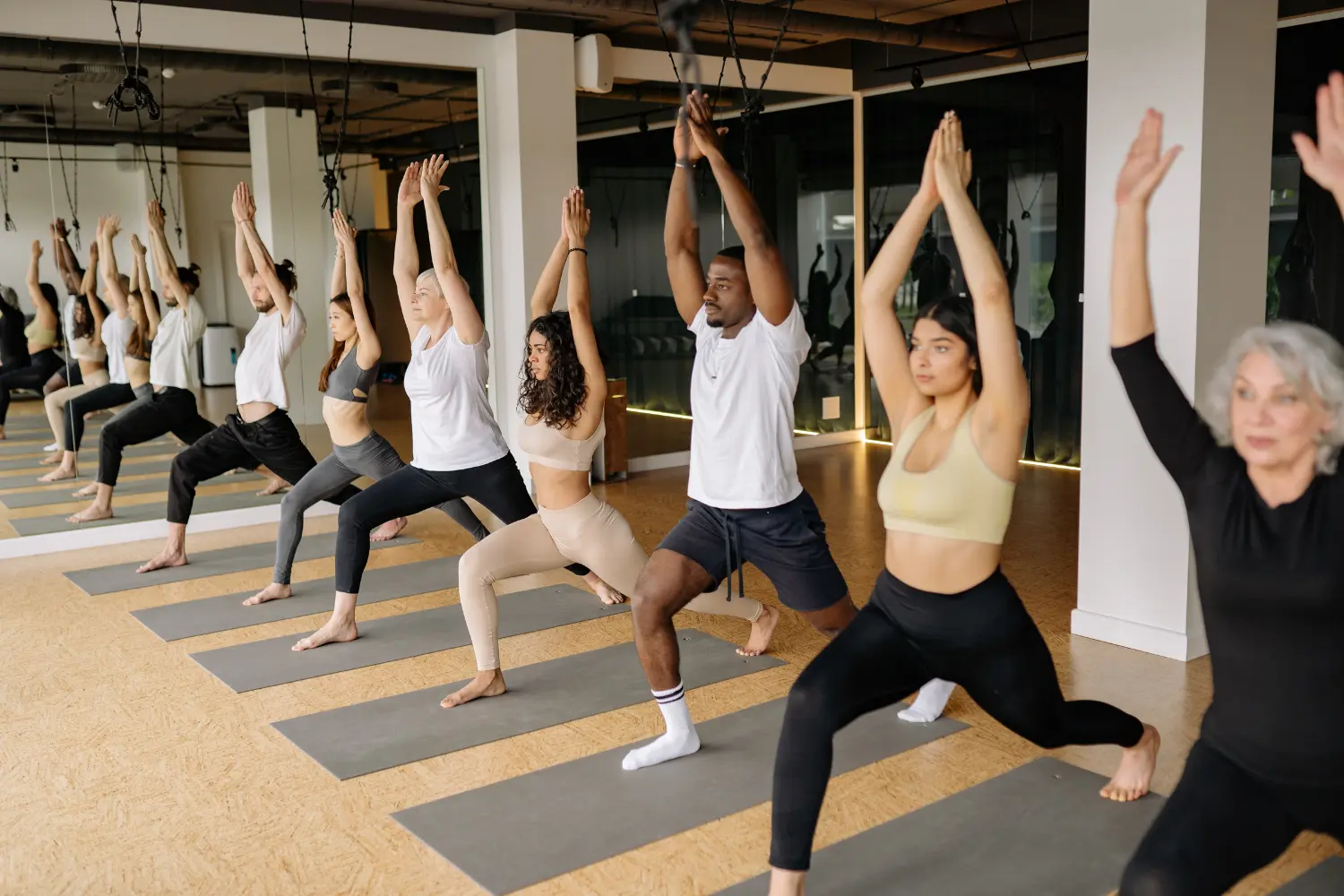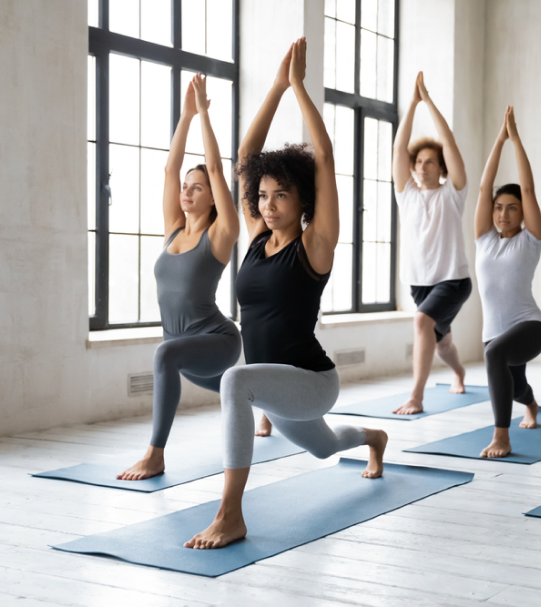
Yoga for Drug Addiction Recovery
Finding Serenity and Strength in Movement on the Path to Healing

Where Yoga Meets Health Care for Substance Abuse Treatment
Yoga, with its centuries-old tradition of holistic wellness, offers a pathway to rediscovering balance and inner harmony. Here at Wellbridge, we embrace yoga as not just a form of exercise but as a tool for cultivating resilience and self-awareness, empowering you to navigate the complexities of addiction recovery with grace and purpose.
In our specialized program, participants are guided through an immersive experience that integrates the principles of yoga with evidence-based practices for addiction recovery. Through mindful movement, breathwork, meditation, and self-reflection, you’ll embark on a transformative journey of self-discovery and healing.
Our expert instructors create a supportive and nurturing environment where you’ll uncover inner strengths and resources that facilitate lasting sobriety and holistic well-being.
What is Yoga for Addiction Recovery?
Yoga for addiction recovery is a specialized program that integrates yoga practices such as physical postures (asanas), breathing techniques (pranayama), meditation, and mindfulness into addiction treatment and recovery plans.[1] This holistic approach recognizes the interconnectedness of the body, mind, and spirit, offering individuals a comprehensive pathway to healing from substance use disorders.
By incorporating yoga into their recovery journey, they can cultivate greater self-awareness, emotional regulation, stress management skills, and overall well-being, addressing the root causes of addiction and building sustainable pathways to sobriety.
Learn More About Our ProgramsWhat Are Some Common Forms of Yoga Therapy?
Yoga therapy type offered at Wellbridge:
- Vinyasa: A dynamic and flowing style that synchronizes movement with breath, often characterized by a series of continuous, fluid sequences.
Some other common yoga therapy types[2] not included at Wellbridge:
- Hatha: A gentle and foundational practice that focuses on basic postures and breath control, suitable for practitioners of all levels.
- Ashtanga: A rigorous and structured practice that follows a specific sequence of poses, emphasizing breath and movement coordination.
- Bikram: Also known as hot yoga, Bikram involves practicing a set sequence of 26 postures in a heated room, promoting detoxification and flexibility.
- Kundalini: A spiritual and meditative practice that incorporates dynamic movements, breathing techniques, chanting, and meditation to awaken the Kundalini energy at the base of the spine.
- Yin: A slow-paced and passive practice that targets deep connective tissues through long-held, seated poses, promoting relaxation and flexibility.
- Restorative: A deeply relaxing practice that utilizes props such as blankets and bolsters to support the body in gentle, restful poses, facilitating stress relief and deep relaxation.
What Are the Benefits of Yoga?
The benefits of yoga are numerous and encompass various aspects of whole-person well-being:[3]
- Improved flexibility: Yoga postures (asanas) help to stretch and lengthen muscles, promoting flexibility and range of motion.
- Increased strength: Many yoga poses require muscles to be engaged to support and stabilize the body, leading to enhanced strength and muscle tone.
- Stress reduction: Yoga’s combination of breathwork, meditation, and mindfulness can help lower stress levels, promote relaxation, and improve overall mood.
- Better balance and coordination: Yoga poses often involve balance and coordination, which can improve proprioception and spatial awareness.
- Enhanced respiratory function: A breath-focused practice of yoga (pranayama) can improve lung capacity, breathing efficiency, and body oxygenation.
- Better mental clarity and focus: Mindfulness techniques used in yoga can help to calm the mind, improve concentration, and enhance mental clarity.
- Pain relief: Yoga has been shown to alleviate chronic pain conditions such as back pain, arthritis, and migraines through gentle stretching and relaxation techniques.
- Improved sleep: Regular yoga practice has been associated with better sleep quality, reduced insomnia, and increased relaxation before bedtime.
- Boosted immune function: Yoga’s stress-reducing effects and promotion of relaxation can support a healthy immune system and reduce inflammation in the body.
- Emotional healing: Yoga provides a safe space for self-reflection, emotional expression, and processing of difficult emotions, contributing to emotional resilience and healing.
How Does The Practice of Yoga Work for Drug Addiction?
Yoga works for drug addiction by addressing addiction on multiple levels—physical, mental, and emotional—and providing you with tools and strategies to support your recovery journey:[4, 5]
- Stress reduction: Yoga practices such as deep breathing, mindfulness, and relaxation techniques help to reduce stress levels, which can be a trigger for drug cravings and relapse.
- Emotional regulation: Yoga encourages individuals to explore and process emotions in a healthy way, fostering emotional resilience and reducing the need for substances to cope with difficult feelings.
- Mindfulness and self-awareness: Yoga cultivates mindfulness or the practice of being present in the moment without judgment. This heightened self-awareness allows individuals to recognize cravings, triggers, and negative thought patterns, empowering them to respond more skillfully.
- Coping skills: Through yoga, individuals learn healthy coping mechanisms to deal with stress, cravings, and other challenges in recovery, such as breathing exercises, meditation, and grounding techniques.
- Physical health: The physical aspect of yoga, including stretching, strengthening, and improving circulation, helps to restore the body’s natural balance and vitality after the toll of drug addiction.
- Social support: Yoga classes provide a supportive and non-judgmental community where individuals can connect with others in recovery, fostering a sense of belonging and mutual support.
- Self-care: Regular yoga practice promotes self-care and overall well-being, encouraging individuals to prioritize their health and make positive lifestyle choices that support their recovery goals.
How Does Yoga Affect the Brain?
Yoga affects the brain in several ways, eliciting various physiological and psychological responses that contribute to overall well-being:[6, 7]
- Stress reduction: Yoga has been shown to activate the parasympathetic nervous system, leading to a decrease in stress hormones such as cortisol and adrenaline. This relaxation response calms the brain’s stress centers, promoting a sense of calm and reducing anxiety.
- Neuroplasticity: Regular yoga practice has been associated with increased neuroplasticity, the brain’s ability to reorganize and form new neural connections. Over time, this may lead to improved cognitive function, memory, and learning capacity.
- Mood regulation: Yoga stimulates the production of neurotransmitters such as serotonin, dopamine, and gamma-aminobutyric acid (GABA), which are associated with mood regulation and feelings of well-being. These chemical changes in the brain can alleviate symptoms of depression and anxiety.
- Mindfulness and awareness: Mindfulness practices incorporated into yoga, such as focused attention on breath and present moment awareness, enhance activity in brain regions associated with self-awareness, attention, and emotional regulation.
- Pain perception: Yoga has been shown to modulate the brain’s perception of pain by activating pain-inhibitory pathways and increasing pain tolerance. This can lead to decreased sensitivity to pain and improved pain management in individuals with chronic pain conditions.
- Executive function: Yoga practices that involve concentration, focus, and coordination, such as balancing poses and breath control exercises, can enhance executive function skills such as attention, planning, and decision-making.
- Emotional processing: Yoga facilitates the processing and regulation of emotions by activating brain regions involved in emotional processing, such as the amygdala and prefrontal cortex. This may lead to greater emotional resilience and the ability to respond to challenging situations with equanimity.
Frequently Asked Questions About Yoga for Recovery From Addiction
Is yoga safe for beginners in recovery?
Yoga can be safe for beginners in recovery, especially when practiced under the guidance of a qualified instructor who is knowledgeable about addiction and recovery. It’s important for beginners to listen to their bodies, start slowly, and avoid pushing themselves too hard.
Can yoga be integrated into other forms of addiction treatment?
Yoga can be integrated into other forms of addiction treatment, such as residential programs, outpatient therapy, and support groups. Many addiction treatment centers offer yoga classes as part of their holistic approach to recovery, alongside counseling, support groups, and other therapies.
Will I need any special equipment or clothing to practice yoga for recovery?
You don’t necessarily need any special equipment or clothing to practice yoga for recovery. However, it’s recommended to wear comfortable clothing that allows for ease of movement and to use a yoga mat for added stability and cushioning during poses.
Can yoga help with stress and anxiety during the recovery process?
Yes, yoga can help with stress and anxiety during the recovery process. The mindful breathing, relaxation techniques, and physical movement practiced in yoga can promote relaxation, reduce stress hormones, and calm the nervous system, leading to a greater sense of peace and well-being.
Sources
[1] Kuppili, P. P., Parmar, A., Gupta, A., & Balhara, Y. P. S. (2018). Role of Yoga in Management of Substance-use Disorders: A Narrative Review. Journal of Neurosciences in Rural Practice, 9(1), 117–122. https://doi.org/10.4103/jnrp.jnrp_243_17 on May 1, 2024
[2] Clinic, C. (2022, June 2). 7 Different Kinds of Yoga and How To Find the Right Practice. Cleveland Clinic; Cleveland Clinic. https://health.clevelandclinic.org/how-to-find-the-best-yoga-class-for-you on May 1, 2024
[3] Johns Hopkins Medicine. (2021). 9 benefits of yoga. Johns Hopkins Medicine. https://www.hopkinsmedicine.org/health/wellness-and-prevention/9-benefits-of-yoga on May 1, 2024
[4] Khanna, S., & Greeson, J. M. (2013). A narrative review of yoga and mindfulness as complementary therapies for addiction. Complementary Therapies in Medicine, 21(3), 244–252. https://doi.org/10.1016/j.ctim.2013.01.008 on May 1, 2024
[5] Streeter, C. C., Whitfield, T. H., Owen, L., Rein, T., Karri, S. K., Yakhkind, A., Perlmutter, R., Prescot, A., Renshaw, P. F., Ciraulo, D. A., & Jensen, J. E. (2010). Effects of Yoga Versus Walking on Mood, Anxiety, and Brain GABA Levels: A Randomized Controlled MRS Study. The Journal of Alternative and Complementary Medicine, 16(11), 1145–1152. https://doi.org/10.1089/acm.2010.0007 on May 1, 2024
[6] Gothe, N. P., Khan, I., Hayes, J., Erlenbach, E., & Damoiseaux, J. S. (2019). Yoga Effects on Brain Health: A Systematic Review of the Current Literature. Brain Plasticity, 5(1), 105–122. https://doi.org/10.3233/bpl-190084 on May 1, 2024
[7] Harvard Health Publishing. (2021, June 12). Yoga for better mental health. Harvard Health. https://www.health.harvard.edu/staying-healthy/yoga-for-better-mental-health on May 1, 2024
Access Whole-Person Care Today
If you or a loved one are struggling with addiction (or dual diagnosis issues), Wellbridge is standing at the ready to assist you. Our individualized treatment and holistic support are just a phone call away.